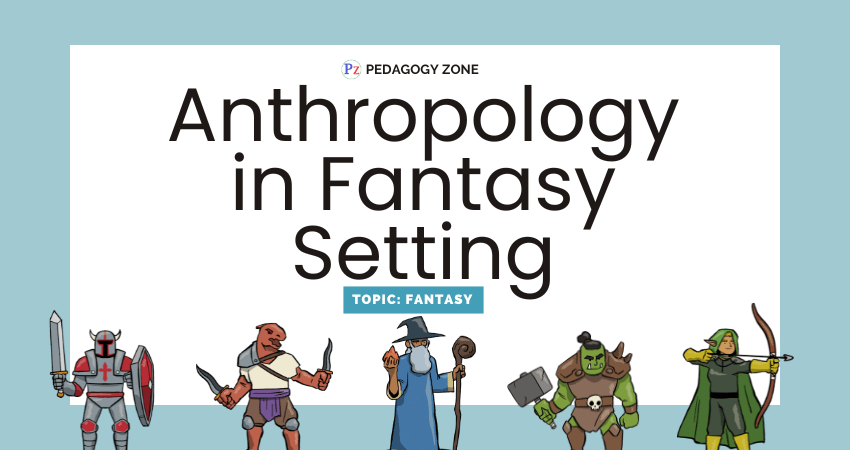When creating a fantasy world, it’s tempting to let imagination run wild and fill the setting with magical creatures, exotic lands, and mystical cultures. However, while fantasy allows for limitless creativity, grounding these elements in real-world principles can lead to a more immersive and believable experience for readers. Anthropology, the study of human societies and cultures, provides a treasure trove of tools and concepts to help writers build richer, more dynamic fantasy worlds.

Here’s how you can use anthropology to turn myths into reality and create compelling fantasy settings.
1. Understand Cultural Dynamics
In the real world, every culture has its own values, norms, rituals, and taboos. When building a fantasy world, start by understanding how cultures develop over time. Consider the following anthropological factors:
- Environment: The geography and climate of a region significantly impact the development of a society. Societies in desert landscapes will differ from those in dense forests or icy tundras. The environment influences food, clothing, shelter, and social structure.
- Economy and Subsistence: How do your societies sustain themselves? Are they hunter-gatherers, pastoralists, agriculturalists, or something else entirely? This aspect affects not just diet and daily life but also social hierarchy, gender roles, and conflict.
- Social Organization: Think about kinship, class, and governance. Are your societies matriarchal or patriarchal? Are they governed by monarchies, councils, or elder leaders? How are families structured? These choices shape interpersonal relationships and power dynamics within your world.
By examining real-world examples and adapting them to your fantasy setting, you can create societies that feel authentic and layered.
2. Create Unique Mythologies and Belief Systems
Every culture has its own mythos—a set of stories, legends, and religious beliefs that explain their world. Anthropology often examines these myths to understand deeper cultural values and worldviews. For a fantasy world:
- Develop Origin Stories: Consider the creation myths of your world. Did gods birth the world from chaos, or was it shaped by ancient cosmic forces? Origin stories can influence everything from architecture to art to warfare.
- Establish Pantheons and Deities: What gods do your characters worship, and how do those gods influence daily life? A god of war may lead a culture to value martial prowess, while a god of harvest might focus on fertility and agriculture.
- Rituals and Festivals: Cultures often have rituals to honor gods, celebrate the seasons, or mark important life events. These rituals can serve as unique world-building elements, adding depth to the society.
Borrowing from anthropology, you can create belief systems that are complex, internally consistent, and deeply tied to the culture and environment of your world.
3. Explore Language and Communication
Language is a crucial component of any culture. It not only conveys information but also carries cultural meanings and values. When designing your fantasy world, think about:
- Linguistic Diversity: Consider creating different languages or dialects for different regions or races. This adds depth and realism to your world. Be mindful of linguistic borrowing and evolution; languages in close contact often exchange words, grammar, and even sounds.
- Non-Verbal Communication: Beyond spoken language, think about body language, gestures, and symbols. In some cultures, a certain gesture may be a sign of respect, while in others, it may be seen as an insult.
- Writing Systems: Does your culture have a written language? What form does it take? Cuneiform, runes, hieroglyphs, or something entirely unique? Writing systems can be used to convey history, laws, and magic.
By considering these elements, you can create cultures with rich languages and communication systems that add to the authenticity of your fantasy setting.
4. Build Complex Societies with Conflict and Cooperation
Anthropology teaches us that no culture is monolithic; every society is composed of multiple, often competing, groups and factions. This diversity can be a source of both conflict and cooperation:
- Social Hierarchies and Inequalities: Consider how power is distributed in your societies. Are there ruling classes, oppressed minorities, or caste systems? How do these dynamics affect everyday life and create conflict?
- Intercultural Interactions: How do different cultures in your world interact? Are they engaged in trade, war, or alliances? Do they have a history of colonization or cultural exchange? These interactions can drive the plot and add depth to your world.
- Rebellion and Revolution: Consider what might lead groups within your societies to rebel or seek independence. Issues of injustice, inequality, or external threat can all serve as catalysts for conflict.
By incorporating these elements, you can create societies that feel alive, with believable motivations and conflicts that add tension to your narrative.
5. Incorporate Symbolism and Material Culture
Anthropologists study artifacts and symbols to understand the values and beliefs of a culture. Similarly, your fantasy world can be enriched by:
- Artifacts and Relics: What objects are considered sacred or culturally significant? A relic of an ancient civilization might serve as a powerful magical artifact, a symbol of national pride, or a cause for war.
- Architecture and Art: The style of buildings, clothing, and art reflects a culture’s values, history, and environment. Are the buildings made of stone, wood, or something else? What materials are available, and how do they affect design?
- Cultural Symbols and Meaning: Consider the symbols that hold power in your world. These could be animals, plants, or abstract designs. How are these symbols used in rituals, flags, or banners?
By considering the material culture of your world, you provide readers with a tangible sense of place and history.
6. Use Anthropological Concepts to Shape Magic Systems
Magic is a staple of fantasy, but it can be even more compelling when grounded in anthropological principles:
- Magic as a Social Institution: In some societies, magic might be an integral part of religious, legal, or social systems. Think about how magic users are perceived: Are they revered priests, feared outcasts, or regulated state officials?
- Magical Belief Systems: Just as religions differ across cultures, so too can beliefs about magic. One culture might see magic as a force of nature, while another views it as divine will or a form of ancestral communication.
- Rituals and Spells: Consider how spells and rituals might be culturally specific. Some might involve complex ceremonies, while others are as simple as a spoken word or a gesture.
When magic is intertwined with the social, religious, and political fabric of your world, it becomes more than a plot device—it becomes a key component of the world-building.
Creating a compelling fantasy setting requires more than just inventing new creatures or magical powers; it requires crafting a world that feels as rich and complex as our own. By leveraging anthropological principles, you can develop cultures, languages, and societies that resonate with readers, transforming myth into reality. When done well, your fantasy world will not just be a backdrop for your story but a living, breathing character in its own right.
| Read More Topics |
| What is a microculture anthropology? |
| Philosophy of Christian education anthropology |
| How to start a Microschool? |





